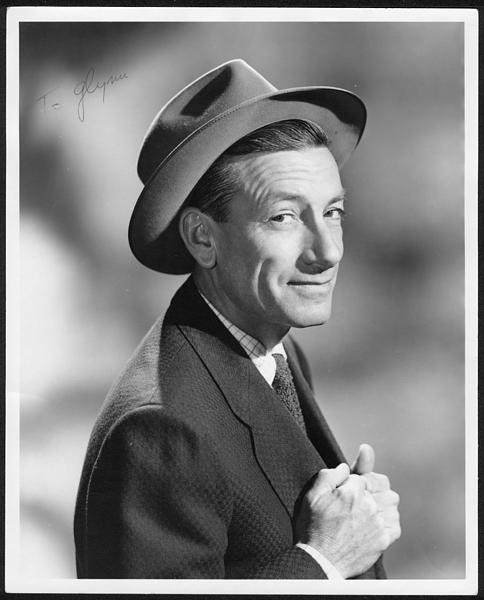Two Small Town American Boys
Who Conquered The Sophisticated Heights Of
Broadway & Tin Pan Alley
HOAGY CARMICHAEL (1899-1981)
MEREDITH WILLSON (1902-1984)

Most of the great American Popular Songwriters of the golden Broadway/Hollywood era were New York City born & bred and usually the children or grandchildren of Jewish immigrants.
There are two prominent exceptions to this musical demographic: one a native of Bloomington, Indiana named Hoagland Howard Carmichael, better known to the world as simply “Hoagy;” and the other a native of Mason City, Iowa named Meredith Reininger Willson, known to the world for/as The Music Man.
The homespun Hoosier Hoagy started off his professional life as a practicing lawyer but rapidly moved into show biz fulltime after the spectacular success of “Stardust.” Hoagy’s Heartland roots determined the folksy flavor of much of his most celebrated work: “Lazybones,” “Ole Buttermilk Sky,” “Little Old Lady,” “Small Fry,” “In the Cool, Cool, Cool of the Evening,” “Heart and Soul,” “Two Sleepy People,” “Baltimore Oriole,” “Georgia on My Mind,” “Up a Lazy River,” “Skylark.” By contrast, “The Nearness of You,” “One Morning in May,” and “I Get Along Without You Very Well,” hold their own among the most sophisticated romantic ballad/torch songs of the era.
The Hoagy Carmichael film and television personality familiar to millions was usually perched on a swiveling piano stool in the local saloon, a cigarette dangling from his lip. In between musical riffs, he might offer a word or two of wisdom to one of the film’s lead characters. His own self-description: “I sing the way a shaggy dog looks.”
Hoagy Carmichael’s rustic persona and impressive musical output stand out as something rare: the voice of the unaffected Middle American rooted in Victorian sensibilities but informed by the modern daring of jazz and blues, a “stardust melody, the memory of love’s refrain.”
Unlike his lovable conman creation Harold Hill, small town Iowan Meredith Willson was a highly trained Music Man, playing principal flute & piccolo for John Philip Sousa’s band in the early 1920s followed by a 5 year stint with the NY Philharmonic. After service in WWII, he became an omnipresent musical director and even a comic personality on radio, writing popular theme songs including “May The Good Lord Bless & Keep You” (THE BIG SHOW) and “You And I” (MAXWELL HOUSE COFFEE TIME). Film scores include those for THE LITTLE FOXES and Chaplin’s THE GREAT DICTATOR.
An already extraordinary musical career was capped by THE MUSIC MAN (1957), an immediate Americana classic that boasted “76 Trombones,” “Goodnight, My Someone,” “Till There Was You,” “Trouble,” “My White Knight,” and “Lida Rose.” His other Broadway offerings included THE UNSINKABLE MOLLY BROWN (“I Ain’t Down Yet”) and HERE’S LOVE (“It’s Beginning To Look A Lot Like Christmas/Pine Cones & Holly Berries.”)
Like Johnny Mercer, Carmichael & Willson made a point of injecting their own rural American backgrounds into their work, producing some of the most charming popular entertainment of their respective eras. Gifted New Yorkers like Rodgers & Hammerstein could only imagine what a musical about flyover country might be. Carmichael & Willson lived it, and their delightfully unique contribution to American song shows it.
If you would like to engage Fred Miller for one of his Lectures-in-Song, please contact him directly at any time. For a full listing of all Lectures, click here.
Fred Miller’s Lectures-In-Song comprise a series of solo programs, each an historical, anecdotal and musical profile of some great personality or important aspect of American Popular Song. These Lectures are delivered by singer/pianist/narrator Miller at the piano, and each reflects his lifetime passion and appreciation for great music. He studied classical piano in his hometown of Albuquerque from ages 7-15 but early on gave up any notion of music as a profession. At that time, Fred assumed a musical career was either one devoted to the rigid discipline of classical music or being a freewheeling rock star, and he accurately decided he had no aptitude for either. However, at age 22, upon hearing Ella Fitzgerald sing Cole Porter, he found his calling and life’s mission.
Through the Seventies and Eighties, Miller studied and absorbed in minute detail the life and times and songs of nearly all the great American composers and lyricists who thrived during Broadway & Hollywood’s Golden Age between the two World Wars. In 1987, he founded Silver Dollar Productions in order to produce operettas, dramas, musicals and small cabarets. Silver Dollar Productions required ensemble casts, props, costumes and, most significantly, the challenges of publicity and selling tickets, and for a dozen busy years, the company presented an unbroken string of varied and highly lauded performances.
In 1999, Miller was simultaneously underwritten by both his local Hunterdon County Library and the Art Alliance of Philadelphia to present a series of six solo Lectures-In-Song, each devoted to one of the premiere Broadway/Hollywood songwriters: George Gershwin, Cole Porter, Irving Berlin, Richard Rodgers, Jerome Kern, and Harold Arlen.
In presenting history, biography and psychology while sitting at a piano singing the superlative songs of his heroes, Miller has found a single performing medium that utilizes most of his intellectual and musical passions.The list of Lectures-In-Song that began with six in 1999 is now more than seventy(and growing!), a joyful tribute to the boundlessly rich field of American Popular Song.
